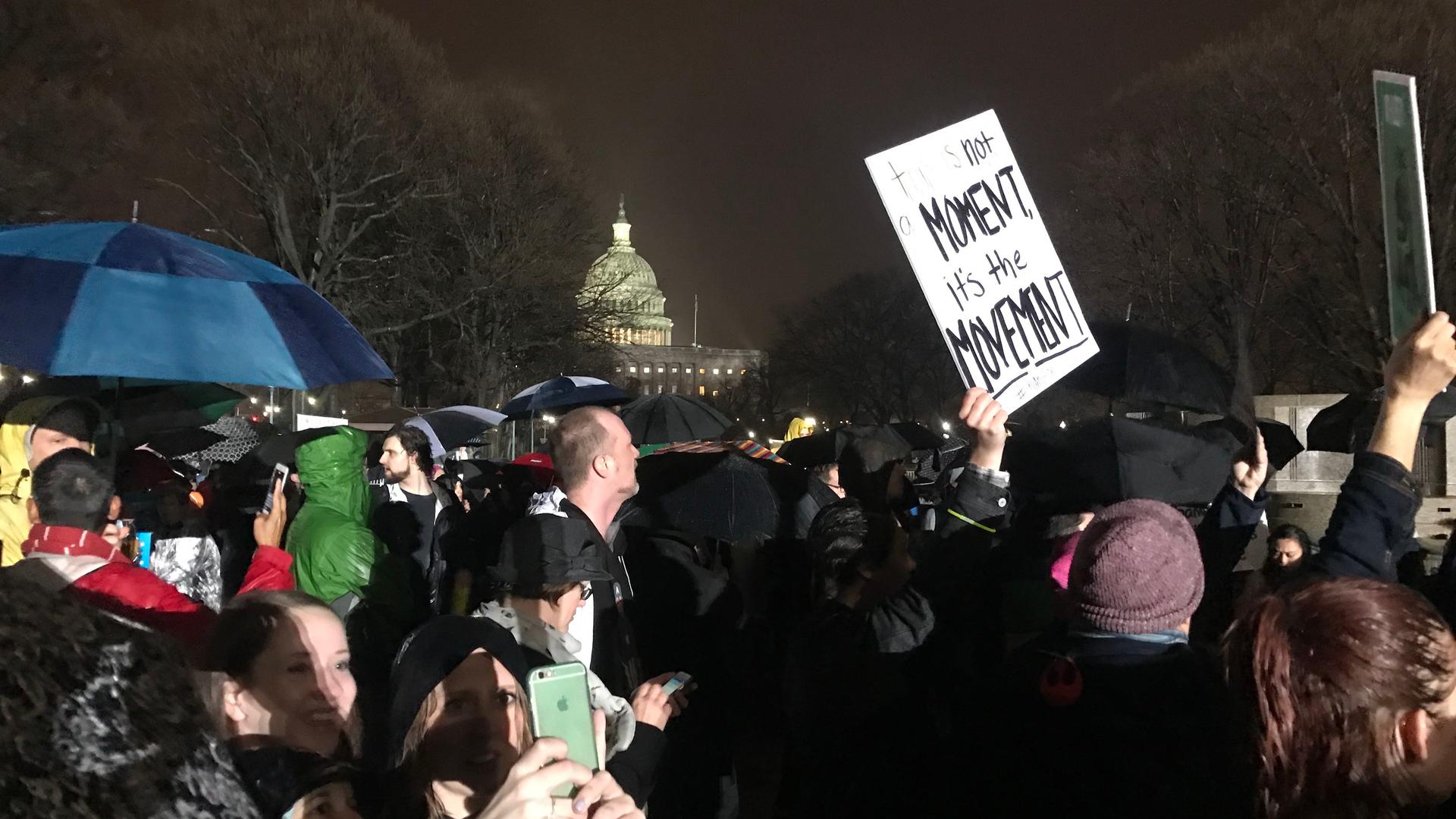Keeping the anti-Trump movement alive
Protesters gather ahead of Donald Trump's speech on Tuesday night.
In the cold, driving rain that drenched Washington, DC, on Tuesday before Donald Trump’s address to Congress, Malcolm Kenyatta told a small but growing crowd of protesters it was their job to deny the president a warm reception.
The 26-year-old activist traveled from Philadelphia to protest on Capitol Hill in the hours leading up to the speech. Turnout at the protest, which went for several hours, was initially lower than organizers expected, but Kenyatta said it did not diminish the event's impact.
“I talk to people who say, ‘I wonder what it would be like to be a part of the civil rights movement?’” said Kenyatta, a speaker for Organizing for Justice. “I tell them, ‘Those people dealt with some rain, too.’”
Kenyatta was one of roughly 200 protesters from a number of anti-Trump groups who converged near the Capitol building for a peaceful protest a short distance from the House Chamber.
Related: Yes, Trump did sound 'presidential.' Here's the science that shows why.
Although many in the crowd said they feared the new policies that Trump might announce, the mood turned festive as organizers encouraged singing and dancing and banging on pots and pans.
“Let’s just be as happy as we can be,” Deyanira Aldana yelled to the crowd, joking that she wanted to make sure Trump could hear the protests.
Aldana was brought to the country from Mexico as a child. Now, at 22, she works with United We Dream, an advocacy organization for childhood arrivals who are undocumented. Aldana, who came from New Jersey to take part in the protest, said recent changes in immigration and deportation policy have some in her community worried, but she's still hopeful about the future.
“We are sending a clear message to President Trump that we are here to stay, that we are not going anywhere, regardless of the lies that are being spewed during the [speech],” said Aldana.
Related: One of the first men stopped by Trump's immigration ban will attend president's address
Another protester, Katie Wurzbach, a Washington, DC, resident, said she's especially concerned about Trump's ties to Russia. "I think it's important to come out, get our voices heard and ultimately [strive for] impeachment," she said. “Trump has awakened this protest spirit inside of me,” Wurzbach said with a laugh.
But she added that not enough people who are critical of the president were willing to take a stand on a rainy night in the Senate Park.
However, a separate anti-Trump rally outside the White House in Tuesday's rain drew a celebrity appearance: Rosie O'Donnell, the comedian who's a staunch Trump foe.
"To Donald Trump and his pathetic band of white, privileged criminal businessmen, I would like to say to him, 'Nyet, sir,'" O'Donnell hollered to the crowd, using Russian for "no."
But back by the Capitol, Jasmyne Gilbert, 25, also from the DC area, said she's afraid that the anti-Trump movement may lose steam as the Trump presidency becomes a fact of everyday life. She hopes to see at least the same number of people protesting Trump’s State of the Union speech next year, but, making sure that people stay engaged might require a change in tactics.
“I think we could keep the energy going after this by following up on actionable things to do,” Gilbert said. “Protests and rallies are good for morale boosting, but now what do we do to keep that momentum going?”
In answer to that, speakers pointed to some of the ways that people can continue to put pressure on Trump’s allies in Congress.
They encouraged people to sign petitions or make donations to advocacy groups. One group advertised a program in the works, akin to an Airbnb for refugees, which they claimed would help those affected by the wars in Syria and other nations impacted by Trump's immigration ban.
Jon Thompson, 31, of College Park, Maryland, who supports Spark Impeachment, a grassroots effort to impeach the president, had a different view from some of his fellow protesters. That is, he wasn't too worried about the long-term future of the anti-Trump movement.
“There’s no way Trump’s going to last a year,” Thompson said.
David Jordan is a student journalist with Northwestern University’s Washington, DC, reporting program.
